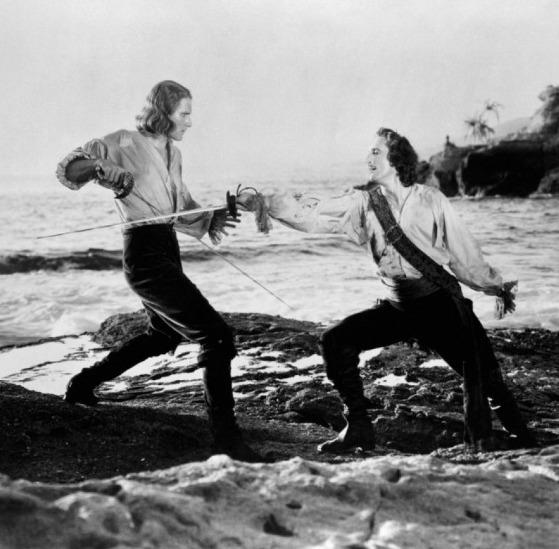Errol Flynn and Swashbucklers, has there ever been an actor more associated with a particular genre? Possibly, but that does not change the fact that Flynn epitomized the swashbuckling hero in a way no other actor (with the possible exception of Douglas Fairbanks) to ever grace the silver screen has. Michael Curtiz's 1935 film Captain Blood, based on Rafel Sabatini's classic novel of the same name, was Flynn's first starring role, and he tackled it with the gusto of a seasoned professional; his costar (in the first of their eight pairings) was Olivia de Havilland, with the villains portrayed by Lionel Atwill and Basil Rathbone.
The film opens with Dr. Peter Blood being summoned in the night by Jeremy Pitt (Ross Alexander); he then proceeds to aid a friend wounded in the Monmouth rebellion. He is arrested for treason and condemned to death by hanging along with countless other "true rebels". On a whim of King James, Blood and a few others are sent to be sold as slaves in the Caribbean. He is bought by the lovely Arabella Bishop (Olivia de Havilland) and is sent to work on the plantation of her uncle: Colonel Bishop (a deliciously sinister Lionel Atwill). Sparks fly between Blood and the young Miss Bishop, even as Blood resents her immensely for her name and her ownership of him. As luck would have it, the governor of the island has the gout and requires the care of a skilled physician: enter Peter Blood. Blood and his fellow slaves plot escape, and an attack by the Spanish provides them an ideal opportunity. Sneaking aboard their ship in the night, they are able to capture the ship and decimate the Spanish with cannon-fire. Their coup is completed by their being able to escape with the ransom paid for by Colonel Bishop and by their humiliating the Colonel (Can you swim, Colonel?). Desperation dictates their path: they become a crew of buccaneers led by Captain Blood. While Captain Blood's fearsome reputation spreads rapidly throughout the Spanish main, he never forgets Arabella and despises the nature of his profession (he has a strict code of conduct for his crew that other pirates scoff at). An alliance with another pirate, Levasseur (Basil Rathbone), sets Captain Blood on a collision course with both Arabella and the possibility of redemption.
Errol Flynn and Olivia de Havilland, in their first starring roles, are magnetic as Captain Blood and Arabella Bishop. As Colonel Bishop, Lionel Atwill does a wondrous job as a man with both power and an inflated ego that has been spurned and humiliated by a (gasp) slave. Basil Rathbone is adequate, in terms of acting, as the French buccaneer Levasseur, but does what he was really hired to do (Rathbone had a reputation as the best fencer in Hollywood) magnificently. The duel between Captain Blood and Levasseur was both exhilarating and remarkably complex for a film from the thirties. The supporting players (Guy Kibbee, Ross Alexander, Henry Stephenson, among others) all do good jobs with their limited screen-time. Though the other performers give good performances, Flynn dominates the picture with his swagger and charisma. While watching, it comes as a surprise to note that this was his first lead (or even substantial) role; it is not a surprise that this is the role made him a star. Olivia de Havilland is radiant in the role of Arabella Bishop and makes the most of her limited screen-time. The on-screen pairing of de Havilland and Flynn was a risk, as both were unknowns, but the decision was brilliant: who else but Flynn could have played Blood?
 The direction in the film is phenomenal, from the action scenes to the clever use of shadows, Curtiz does some of his best work in Captain Blood. Better known for his films Casablanca and The Adventures of Robin Hood (which also stars Flynn, de Havilland, and Rathbone), Michael Curtiz is often regarded as one of the most important and popular directors of early Hollywood. The naval battle scenes (filmed with complex and accurate miniatures) are fantastic and surprisingly realistic considering the lack of CGI. The set design is outstanding: it lends the film a considerable amount of legitimacy and effect on sight, something many other swashbuckling films lack.
The direction in the film is phenomenal, from the action scenes to the clever use of shadows, Curtiz does some of his best work in Captain Blood. Better known for his films Casablanca and The Adventures of Robin Hood (which also stars Flynn, de Havilland, and Rathbone), Michael Curtiz is often regarded as one of the most important and popular directors of early Hollywood. The naval battle scenes (filmed with complex and accurate miniatures) are fantastic and surprisingly realistic considering the lack of CGI. The set design is outstanding: it lends the film a considerable amount of legitimacy and effect on sight, something many other swashbuckling films lack.
A facet of the film that is of particular note is the score, one of the first composed by Erich Wolfgang Korngold. The score is both rousing and memorable, and is a large part of what makes the film so immensely enjoyable. The scores of Korngold are matched in influence only by (possibly) the scores of John Williams, such as those he composed for Star Wars and Superman. What makes Korngold's feat all the more impressive is that the score, which is over ninety percent original material, was composed in a mere three weeks.
Though it may lack the production values and fantastical elements of more recent pirate films (The Pirates of the Caribbean franchise, for example), Captain Blood still sets the bar for pirate adventures, with Flynn and de Havilland truly making it a (please forgive me for this lone nautical pun) voyage to remember.
8/10
Note: This review was previously posted on another blog I wrote.
Note: This review was previously posted on another blog I wrote.

No comments:
Post a Comment